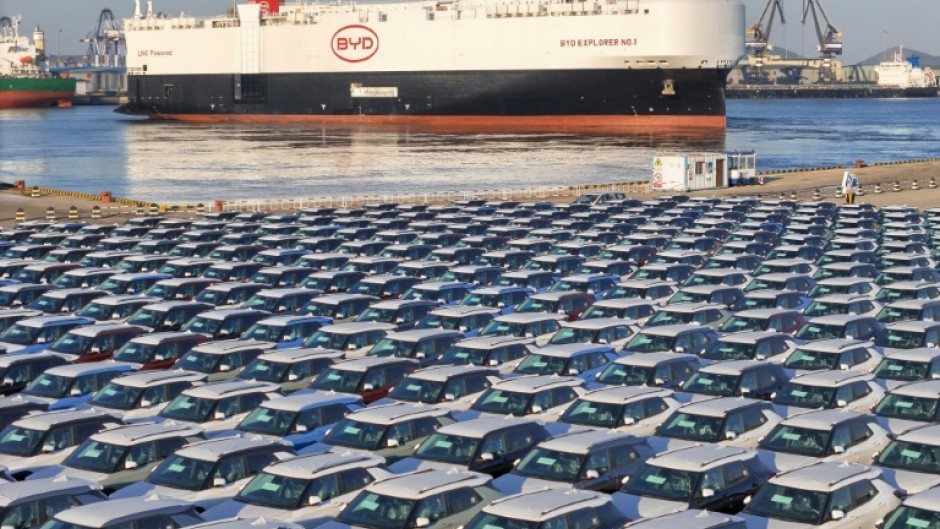The European Union warned on Wednesday it would slap additional tariffs of up to 38 percent on Chinese electric car imports from next month after an anti-subsidy probe, a move that risks provoking a bitter trade war.
Brussels angered Beijing by launching the investigation last year in a bid to defend European manufacturers in the face of a surge of cheaper Chinese imports.
The Chinese commerce ministry slammed the decision as "naked protectionist behaviour", in an angry statement after the announcement.
There is also dissent within the EU with Germany, a major trade partner to China, saying the tariffs would harm German companies.
The European Commission has proposed a provisional hike of tariffs on Chinese manufacturers: 17.4 percent for market major BYD, 20 percent for Geely and 38.1 percent for SAIC.
The EU said the amount depended on the level of state subsidies received by the firms.
Electric car producers in China that cooperated with the EU will face a tariff of 21 percent, while those that did not cooperate would be subject to a 38.1 percent duty.
This would be on top of the current import duty of 10 percent.
The commission pointed to "unfair subsidisation" in China, which it said "is causing a threat of economic injury" to EU electric car makers.
- 'Space for negotiation' -
A Chinese commerce ministry spokesperson said the EU's decision risked "creating and escalating trade friction".
Foreign ministry spokesman Lin Jian warned: "China will take all necessary measures to firmly safeguard its legitimate rights and interests."
To halt the extra tariffs being levied, Beijing and Brussels must resolve the subsidies issue.
"The commission went out of its way to show there is space for negotiation," said Francesca Ghiretti, a fellow on economic security at Washington-based think tank CSIS.
But Ghiretti told AFP it was not exactly clear what China could offer "that would actually mitigate the existing concerns".
The tariffs will apply provisionally from July 4 and then definitively from November unless there is a qualified majority of EU states -- 15 countries representing at least 65 percent of the bloc's population -- voting against the move.
The EU tariffs, while high, are lower than the 100-percent rate the United States imposed from last month on Chinese electric cars.
- German concerns -
Europe's automotive sector is the jewel in its industrial crown -- boasting iconic brands such as Mercedes and Ferrari -- but it faces threats including China's head-start in the switch to electric.
Brussels wants to put the brakes on what it claims were unfair practices undercutting Europe's automakers, which face a 2035 deadline to phase out new sales of combustion engine cars.
Germany, Hungary and Sweden previously expressed concerns about slapping higher duties.
German Transport Minister Volker Wissing said the "punitive tariffs hit German companies" in a social media post.
"Cars must become cheaper through more competition, open markets and significantly better business conditions in the EU, not through trade war and market isolation," Wissing said.
The tariffs "will not solve the challenges" facing the industry, Germany's VDA auto industry association president Hildegard Mueller said, instead calling for efforts to make Europe more attractive as a place for manufacturers.
Luc Chatel, head of the French auto industry association, insisted on the importance of a level playing field, while Italian Industry Minister Adolfo Urso welcomed the commission's decision.
China is an important market for German car makers, while Hungary, which a month ago hosted a visit by Chinese President Xi Jinping, is clearing land for a BYD factory to be built next year.
France's Renault, Peugeot and Citroen are virtually absent in China.
Electric automaker Tesla is the only company that has asked the EU to provide its own duty rate calculated based on evidence it has submitted.
- Retaliation -
Chinese media ramped up threats that Beijing could target EU exports, including pork and dairy products, ahead of Wednesday's decision.
In January, China launched an anti-dumping investigation into brandy imported from EU, in a move seen as targeting France, which pushed for the commission's probe.
A group representing French cognac producers said it was "deeply concerned" about possible Chinese retaliation.
Despite the fears, expert Ghiretti said "an escalatory trade war" between the EU and China was not "surely on the table" and could be avoided.
China is the world's biggest car exporter and Europe is a critical market for it.
EU imports of EVs from China mushroomed from around 57,000 in 2020 to around 437,000 in 2023, the US-based Peterson Institute for International Economics said.
Germany's Kiel Institute for the World Economy said a 20-percent tariff would mean 125,000 fewer Chinese electric cars to the EU, worth almost $4 billion.
By Raziye Akkoc With Ludovic Ehret In Beijing
*The information contained in the article posted represents the views and opinions of the author and does not necessarily represent the views or opinions of eNCA.com

